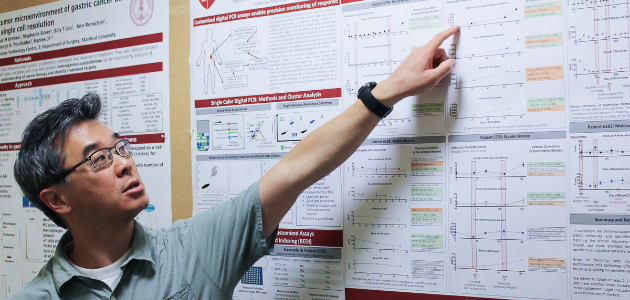Gastric Cancer Registry Makes Strides Towards Major Data Expansion
Earlier this year, the Gastric Cancer Foundation committed $257,856 to the Gastric Cancer Registry at Stanford University, which is using the funding for a major expansion. The registry’s researchers, led by Hanlee Ji, MD, Associate Professor of Medicine, are now hard at work processing more than 300 gastric samples from the Intermountain Healthcare Biorepository.
The Intermountain samples will greatly expand the registry, which currently includes epidemiological data from 557 gastric cancer patients and family members, as well as tumor tissue samples from a subset of patients. Paired data derived from the samples is included in the registry’s Genome Explorer, a HIPAA-compliant online portal that’s available to any scientist who wants to perform analyses of stomach tumors.
The Intermountain cohort consists of 308 tissue samples from 154 gastric cancer patients. Each patient donated one tumor sample and one sample of normal stomach tissue. The registry’s scientists are taking a “multiomics” approach to processing the samples. This is crucial to Dr. Ji’s mission of building a centralized clinical and genomic database. He is working to unearth the deeply complex molecular landscape of gastric tumors and facilitate a variety of translational research into potential therapeutic targets, risk factors and preventative strategies.
The team is sequencing the whole genome of each sample, as well as the whole exome. The exome is the part of the genome that codes for the production of proteins in the body. Sequencing the tumor’s exome separately from that of non-cancerous samples will allow researchers to delve into the physiological differences between gastric tumors and healthy tissue in individual patients.
The registry’s researchers will also extract RNA from the samples. DNA codes for RNA, which then codes for proteins, so RNA serves as a key indicator of gene expression. That means scientists can study RNA levels to determine if a particular protein is amplified in stomach tumor cells versus normal tissue.
As of the end of October, DNA and RNA had been extracted from all Intermountain samples, and registry staff had prepared genome and exome libraries from 164 samples for next-generation sequencing. They are working on the analysis and aim to upload refined bioinformatic datasets from the first batch of samples by the end of the year.
New features will also be coming soon to the Genome Explorer. For example, users will be able to query “differential expression,” an added layer of comparison that can be applied to RNA sequencing data. Instead of just seeing an average profile of the RNA that’s present in a tumor sample, researchers will be able to observe significant differences in gene expression between normal stomach tissues and tumor tissues within a patient .
“Thanks to the Foundation’s generosity, we are constructing sophisticated datasets at a higher level and bringing stomach cancer research a step forward,” says Dr. Ji.
To learn more about the Registry, click here.




